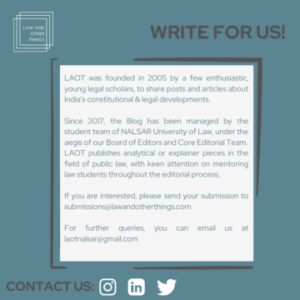CCLP is pleased to invite submissions for the Competition Law Observer Blog
Table of Contents
- ABOUT NATIONAL LAW UNIVERSITY, JODHPUR
- ABOUT CCLP
- ABOUT COMPETITION LAW OBSERVER
- SUBMISSION GUIDELINES
- CONTACT DETAILS
ABOUT NATIONAL LAW UNIVERSITY, JODHPUR
National Law University Jodhpur (NLUJ) is one of the foremost law schools in India. Since its establishment in 1999, it has endeavoured to produce exceptional lawyers and legal scholars and has aimed at pushing and challenging the existing boundaries of knowledge. Based on MHRD NIRF rankings 2020, NLUJ was ranked 5th among the best law universities of the country. The University was recently selected by the Competition Commission of India into a panel of reputed institutions, to carry out competition assessment of the economic legislations, bills, and policies.
ABOUT CCLP
CCLP was established as an initiative to promote interdisciplinary research in the field of competition law and policy making. As a part of this initiative, CCLP publishes its flagship journal, the Indian Competition Law Review (“ICLR”). ICLR serves as a platform for understanding existing trends as well as setting out new ideas. The website of the journal can be accessed at http://iclr.in/.
ABOUT COMPETITION LAW OBSERVER
In furtherance of its objective to promote discussion and deliberation on various facets of competition law and address the contemporary issues, CCLP had started the Competition Law Observer Blog which, over the years, hosted submissions only from the members of CCLP. It is now thrilled to invite submissions from scholars, practitioners, authors, and students with the object of furthering discussion on competition law. The Blog can be accessed at http://blog.iclr.in/.
SUBMISSION GUIDELINES
Submissions
Submissions must be in a Word format (‘.doc’ or ‘.docx’). All submissions are to be sent via email to cclp@nlujodhpur.ac.in. The subject of the email should be titled – “Submission for Blogs_Name of the Author(s)”. While submitting to the Blog, the author(s) are required to submit an undertaking that:
- They warrant that the manuscript is their original work, and has not been simultaneously been submitted to any other platform for consideration;
- They consent to the publication of the submitted piece on the Blog provided that they are fully acknowledged as the author(s).
Authorship
Co-authorship up to two authors is allowed. Refrain from mentioning the name, institutional affiliation, or any other detail of the author(s) in the document to facilitate the double-blind review process.
Deadline
There is no deadline for submission of Blog posts. Submissions will be accepted on a rolling basis.
Originality
All works must be original and unpublished. The plagiarism limit is 15%.
Length
The word limit for the submission is 1000- 1500 words. This word limit is exclusive of the endnotes (if any). Longer posts may be accepted should the topic require an extensive discussion, and, if required, they may be published in parts, subject to the discretion of the editors.
Headings
Authors are encouraged to use headings to break up long posts. Headings should not be of more than one level and should be in bold.
Font and spacing
The title of the post must be formatted to Times New Roman font size 14, all Caps, and in bold. The main body of the text must be formatted to Times New Roman font size 12 with 1.5 line spacing with a single line space between paragraphs; and the end notes must be formatted to Times New Roman font size 10 with single line spacing.
Referencing
All references must be in the form of hyperlinks in the body of the submission. In case no hyperlink is available for any reference, use of endnotes is recommended. The endnotes must be in conformity with the 4th edition of the Oxford University Standard for the Citation of Legal Authorities (OSCOLA) style of citation. The author(s) are advised to give specific details, such as the Page or the Paragraph number of the reference, either in the body of the text itself or in the endnotes. No speaking endnotes or footnotes are allowed.
REVIEW PROCESS
All texts will go through a double-blind peer review. The review process consists of two tiers – preliminary review and detailed review.
At the end of the preliminary review, the authors will be informed of the Editorial Board’s decision of whether the submission is accepted or rejected for publication. This preliminary review is done within 7-8 working days.
If a submission is accepted for publication, the Board will then conduct a detailed review process. Amendments and suggestions, if any, to the manuscript, shall be communicated to the authors at the earliest. The final publication of the manuscript is contingent on the incorporation of such suggestions to the satisfaction of the Editorial Board.
EDITORIAL POLICY
- The Editorial Board retains complete discretion over acceptance or rejection of manuscripts and it will not entertain requests for advance decisions based on abstracts, topic proposals or outlines.
- Post-review, manuscripts may be returned to the author(s) with suggestions related to substance and/or style.
- Upon acceptance of the manuscript for publication by the Editorial Board, the copyright is vested in the Blog. However, the moral rights over the manuscript shall vest in the author(s).
- Upon acceptance of the manuscript for publication, the same shall not be published on any other platform. Cross publication is permitted subject to the prior approval of the Editorial Board.
CONTACT DETAILS
For further details, contribution guidelines and editorial policy, click here. For further details regarding CCLP, click here.
All queries can be addressed to the Editorial Board at cclp@nlujodhpur.ac.in.
Previous Posts
International Seminar on Environmental Law & Policy by AGISS Research Institute & MVN University
Call for Papers: Law Audience Journal: Vol 4, Issue 4, e-ISSN: 2581-6705
RTI as a Tool for Electoral Transparency and Accountability
Keywords
Law Observer Blog



![RGNUL Financial and Mercantile Law Review Blog [RFMLR] Submissions on Rolling Basis](https://thelawcommunicants.com/wp-content/uploads/2023/10/RGNUL-Financial-and-Mercantile-Law-Review-Blog-RFMLR-Submissions-on-Rolling-Basis-300x200.jpg)
